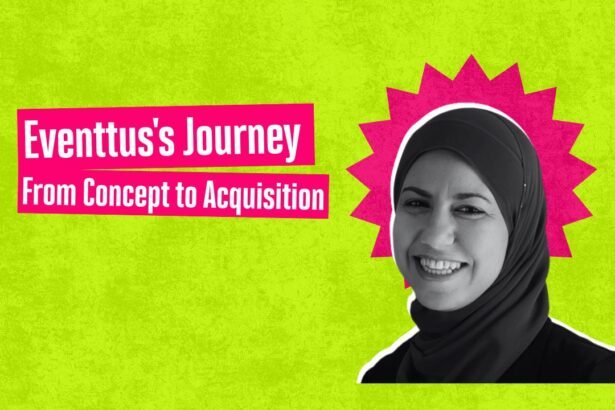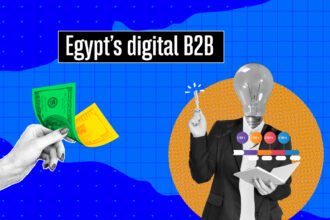Eventtus began as an idea for a networking app aimed at event attendees, born from the founder’s – Mai Medhat- personal experience of noticing a lack of connection among people at events. However, initial conversations with event organizers quickly revealed a more urgent need: organizers were primarily concerned with selling tickets, ensuring attendance, and managing last-minute cancellations.
This critical insight led to Eventtus’s pivotal shift towards providing a robust ticketing and registration solution, which they initially offered for free or at a minimal fee to build trust with organizers.
Over time, Eventtus evolved significantly, becoming a dedicated B2B technology platform for large-scale events, diverging from a B2C model like Eventbrite. Their core offering transitioned to a mobile app designed to manage speakers, stages, panels, and talks, with networking integrated as a feature. They also strategically integrated functionalities like 3D maps for large public exhibitions rather than building them in-house, as these were not considered core intellectual property and were only used by a percentage of customers.
Eventtus employed a varied business model: for ticketing, it was typically a percentage of ticket sales, while for their app and lead box solutions (for exhibitors), they charged a flat fee per event or per exhibitor, simplifying pricing based on event size. Recognizing the nascent state of online payments in Egypt, Eventtus innovatively offered cash-on-delivery and later partnered with companies like Vodafone to facilitate cash payments at retail stores, significantly expanding their reach to a mass audience. Geographically, Eventtus started in Egypt, expanded into Dubai and the Middle East, and eventually achieved an international presence in the US and UK through strategic partnerships.
The Acquisition Process – A Stressful Yet Strategic Endeavor
The acquisition of Eventtus by Bizzabo, a sister company of Startup Grind, was a multi-stage and intense process. Bizzabo had been a loyal customer of Eventtus for three to four years, utilizing their platform for global Startup Grind conferences. The initial connection was made through a local chapter, and Eventtus proactively pitched their product to Bizzabo, offering a “pay-for-first-year, then extend if you like it” deal, which set the price from the outset.
The COVID-19 pandemic profoundly impacted the events industry, causing Eventtus’s in-person event revenues to drop to zero. This led to a crucial “founder-to-founder” conversation between Eventtus and Bizzabo about market survival and future strategies. During March-April 2020, Bizzabo made an initial offer to acquire Eventtus, but the price Eventtus requested was “crazy high” for Bizzabo at the time, and the deal did not materialize.
Despite this, they maintained contact, with Eventtus providing product updates6. The acquisition conversation reignited after Bizzabo secured a Series C funding round and Eventtus successfully launched its virtual event platform. The decision to sell was a highly strategic one, driven by the founders’ foresight into a future dominated by hybrid events (combining in-person and virtual elements). They observed that large companies were slow to adapt, while new startups like Hopin were rapidly raising capital and dominating the virtual space. Eventtus concluded that to compete effectively at scale, they would either need to raise significant capital themselves or opt for an acquisition.
The acquisition process itself was described as “very, very stressful” and “painful”, particularly for first-time founders. It required immense mental effort, complex negotiations, and coordinating with all shareholders to secure their agreement. The founder also experienced an “identity crisis” after selling what was considered their “baby”. Despite the emotional toll, the decision was ultimately seen as the right one, especially as the market later “crashed” (referring to market shifts and consolidation, such as Hopin’s asset sales).
Eventtus was fortunate to receive around three offers, eventually choosing between two strong contenders. Navigating investor expectations, especially for later-stage investors, was challenging but managed by presenting a clear, unemotional hypothesis about market direction and available options.
Key Learnings from the Eventtus Journey
The founder, Mai Medhat, shared several critical lessons learned from the Eventtus journey:
• Product Development
◦ Value Delivery: A product must deliver end-to-end value from day one.
◦ Defensibility: Building a product with strong defensibility through its design, business model, market, and value proposition is crucial.
◦ Build vs. Buy: It’s essential to strategically decide what functionalities to build in-house (core IP, quality, data control, customization) versus what to integrate or outsource (complementary features) to optimize resources and time. The D map feature was an example of strategic integration after testing multiple vendors.
◦ Focus: Pivoting to a B2B model for large business events allowed Eventtus to focus its development efforts and specialize, leading to a more robust infrastructure for complex requirements like group tickets and diverse registration forms9.
• Commercial & Sales Strategies
◦ Sustainable Model: Every expense, whether for product, marketing, or sales, must contribute to revenue, ensuring business sustainability. Decisions like rebranding should only be made if they directly add value.
◦ Data-Driven Decisions: Market testing and experiments should always be based on data to avoid wasting resources on unproductive ventures.
◦ Sales as a Science: Sales is a process-driven discipline that requires a well-defined “sales playbook” from the outset.
◦ Ideal Customer Profile (ICP): Identifying the ideal customer profile is the most crucial step in sales, helping to target the right audience, avoid wasting time, and improve conversion rates. This profile is dynamic and requires continuous refinement through data.
◦ CRM Hygiene: Automating data extraction and input into the CRM (Customer Relationship Management) system is vital for accurate data, forecasting, and optimization, as sales teams often dislike manual administrative work.
◦ Funnel Predictability: A simple, well-structured sales funnel with clear stages is necessary for predictable revenue forecasting.
◦ Call Recording: Recording sales calls is critical for B2B sales to coach teams, identify process gaps, understand customer objections, and spot recurring feature requests or competitor mentions, ultimately empowering the sales team.
◦ Battle Cards: Creating “battle cards” against competitors helps the sales team quickly address common objections and highlight their product’s advantages.
• Marketing & Distribution
◦ Early Marketing: Marketing must start early and not solely rely on the product’s quality or existing networks.
◦ Distribution is Key: Effective distribution is crucial for differentiation in the market.
◦ Experimentation: Test different messages for various customer personas.
◦ Personalized Branding: Sharing the company’s story, including its ups and downs, and humanizing the brand by highlighting the people behind it, builds trust, as people often buy from humans they trust.
• Funding & Resource Management
◦ Adaptation during Crisis: During COVID-19, Eventtus secured bridge funding from existing and new investors by presenting a plan to pivot to virtual/hybrid events.
◦ Cost Optimization: They significantly reduced costs by eliminating offices and administrative overhead. The virtual platform also removed geographic limitations, opening up a global market.
• General Entrepreneurial Lessons
◦ Emotional Rollercoaster: The entrepreneurial journey, especially an acquisition, is emotionally challenging, often leading to an “identity crisis” for founders.
◦ Passion for Creation: The founder expresses a continued passion for “zero-to-one” building and the adrenaline of starting new ventures.
◦ Learning from Mistakes: The aim is to apply all previous learnings to new ventures, hoping for a different experience.
◦ Balancing Act: Success in startups requires a balance between “crazy passion” and calculated steps; sometimes, big, “mad ideas” and leaps of faith are necessary.
◦ Letting Go of Pressure: For a second venture, it’s important to release the pressure from past success and embrace the new journey, acknowledging that success or failure is part of it.
◦ Network Importance: A strong network facilitates fundraising and support.
◦ Strategic Hiring: It’s crucial to hire the right, experienced talent from the start, especially for leadership roles, as they will push the company forward.
◦ Listening vs. Sticking to Vision: There’s a delicate balance between listening to advice and feedback from others and staying committed to one’s vision.
◦ Scenario Planning: Being prepared for unexpected market changes (like COVID-19) is vital
As we reflect on Eventtus’s remarkable ability to navigate crises, pivot decisively, and exit strategically through an acquisition, it prompts a crucial question for all of us: Given the inherent unpredictability and intense competition in today’s markets, how prepared is your own venture to not just adapt to, but truly thrive through strategic, even “painful,” decisions, ensuring long-term sustainability and growth?




